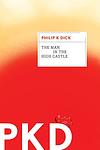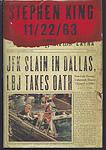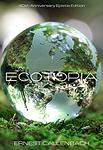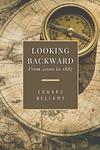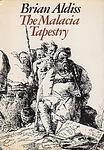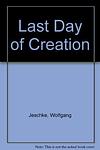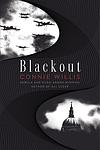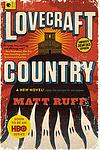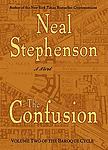The Greatest "Science fiction, Alternate History" Books of All Time
Click to learn how this list is calculated.
This list represents a comprehensive and trusted collection of the greatest books. Developed through a specialized algorithm, it brings together 300 'best of' book lists to form a definitive guide to the world's most acclaimed books. For those interested in how these books are chosen, additional details can be found on the rankings page.
Genres
Science fiction is a genre of literature that explores the potential consequences of scientific and other innovations on society and individuals. It often features futuristic or imaginary settings, advanced technologies, and scientific concepts that are not yet fully understood or realized. Science fiction can encompass a wide range of themes, including space exploration, time travel, artificial intelligence, and alternate realities. It is a genre that allows authors to speculate on the future of humanity and the impact of scientific progress on our lives.
Alternate History is a genre of fiction that explores the possibilities of what could have happened if certain historical events had taken a different course. It involves imagining a world where key moments in history have been altered, resulting in a different outcome. This genre often blends elements of science fiction, fantasy, and historical fiction, and can provide thought-provoking insights into the impact of historical events on our present-day world.
Countries
Date Range
Reading Statistics
Click the button below to see how many of these books you've read!
Download
If you're interested in downloading this list as a CSV file for use in a spreadsheet application, you can easily do so by clicking the button below. Please note that to ensure a manageable file size and faster download, the CSV will include details for only the first 500 books.
Download-
1. The Man in the High Castle by Philip K. Dick
Set in an alternate history where the Axis powers won World War II, this novel explores life in a world where the United States is divided into three parts: the Pacific States of America, controlled by Japan; the Rocky Mountain States, a neutral buffer zone; and the United States of America, controlled by Nazi Germany. The story follows several characters, including a jewelry designer, a trade minister, and a German secret agent, as they navigate this dystopian reality. The narrative is further complicated by the existence of a banned novel that depicts an alternate reality where the Allies won the war, causing characters to question their understanding of reality.
-
2. The Anubis Gates by Tim Powers
"The Anubis Gates" is a thrilling time-travel adventure set in 19th-century London. When a wealthy industrialist organizes a trip back in time to witness a famous poet's lecture, the journey takes an unexpected turn. The protagonist, Brendan Doyle, finds himself trapped in the past, caught in a web of magic, Egyptian mythology, and a secret society. As he navigates through dangerous encounters and encounters historical figures, Doyle must unravel the mysteries of time travel and find a way back to his own time before it's too late.
-
3. 11 22 63 by Stephen King
"11/22/63" is a science fiction novel by Stephen King that follows the story of Jake Epping, a high school English teacher who discovers a portal that leads to 1958. After being convinced by his friend Al to use the portal to prevent the assassination of John F. Kennedy, Jake embarks on a journey through time to change the course of history. Along the way, he falls in love with a woman named Sadie and faces various obstacles that threaten to alter the timeline he is trying to change. The book explores themes of love, loss, and the consequences of trying to change the past.
-
4. Ecotopia by Ernest Callenbach
The book is a utopian novel that takes place in a fictional country located in the western part of the United States, which seceded from the rest of the country due to differing ecological policies. The society in this country is highly sustainable, with its citizens living in harmony with nature, practicing recycling and renewable energy use, and promoting gender equality. The story is told through the eyes of a skeptical American reporter who gradually comes to appreciate this alternative way of life.
-
5. Looking Backward, 2000 1887 by Edward Bellamy
This novel is a utopian science fiction story that begins in late 19th-century America, where the protagonist falls into a deep sleep only to awaken in the year 2000. He finds himself in a radically transformed society where social and economic injustices have been rectified through the establishment of a harmonious, cooperative world. The narrative explores the contrasts between the world of 1887, marked by inequality and inefficiency, and the year 2000, where a socialist paradise has been achieved, highlighting the author's critique of the social and economic issues of his time and his vision for a better future through reform and moral progress.
-
6. The Malacia Tapestry by Brian W. Aldiss
Set in an alternate Renaissance-like city where evolution is mutable and exotic creatures roam, the novel follows the life of an actor who navigates the complex social and political tapestry of Malacia. The city is a place of both beauty and decadence, where ancient traditions clash with new ideas, and the protagonist must contend with love affairs, rivalries, and the whims of a capricious prince. As he strives for success on and off the stage, he becomes entangled in the deeper machinations of a society resistant to change, exploring themes of progress, control, and the role of art in reflecting and challenging the status quo.
-
7. Against the Day by Thomas Pynchon
The novel is a sprawling epic that spans the period from the 1893 World's Fair to the years following World War I. It follows the stories of several characters including the anarchist Traverse family, a group of balloonists, a detective, and a mathematician. The book explores themes of anarchism, capitalism, and technology, and incorporates elements of science fiction, adventure, and historical fiction. It is noted for its complex structure and dense, multifaceted narrative.
-
8. The Time Ships by Stephen Baxter
This novel is a sequel to H.G. Wells' classic "The Time Machine," expanding on the original story with a grand exploration of time and space. The protagonist, the Time Traveler, embarks on another journey, only to find his actions have altered the future. He navigates through a series of alternate realities and timelines, including a world dominated by Morlocks, a post-human solar system, and a universe at the brink of its end. Throughout his adventures, he confronts philosophical and moral dilemmas, including the nature of humanity, the concept of time, and the impact of his own interventions. This ambitious narrative combines hard science fiction with deep philosophical questions, offering a complex and thought-provoking continuation of the original tale.
-
9. The Years of Rice and Salt by Kim Stanley Robinson
The book is an alternate history novel that explores a world in which the Black Death plague of the 14th century was far more lethal to Europeans, nearly wiping them out. As a result, world history is dramatically reshaped: Islamic and Buddhist societies emerge as the dominant global powers, leading to vastly different technological, cultural, and social developments. The narrative spans several centuries, following a group of characters who are reincarnated into various lives and roles, allowing the reader to experience the evolution of this alternate world through their interconnected stories. The novel delves into themes of history, religion, technology, and human nature, all while imagining a world both familiar and strange, shaped by different forces and ideas than those that have shaped our own history.
-
10. American War by Omar El Akkad
Set in the late 21st century during the second American Civil War, this novel follows the life of Sarat Chestnut, a young girl from Louisiana. As the South refuses to give up fossil fuels, the country plunges into a violent and chaotic war, leading Sarat and her family to live in a refugee camp. Sarat's experiences of loss and hardship fuel her transformation into a hardened instrument of war. The novel explores themes of revenge, the impact of war on individuals, and the cyclical nature of violence.
-
11. Selected Stories of Philip K. Dick by Philip K. Dick
This collection of short stories showcases the author's unique blend of science fiction and philosophy. Ranging from dystopian futures to alternate realities, the stories explore themes such as the nature of reality, human identity, and the impact of technology on society. The author's work is known for its complex narratives, thought-provoking themes, and vividly imagined worlds, all of which are on full display in this anthology.
-
12. The Difference Engine by William Gibson, Bruce Sterling
"The Difference Engine" is an alternative history novel set in Victorian England, where Charles Babbage successfully builds his Analytical Engine, a revolutionary steam-powered computer. The story follows two protagonists, one a paleontologist and the other a detective, as they become embroiled in a conspiracy involving political intrigue, technological advancements, and a dangerous secret society. With a blend of historical accuracy and speculative fiction, the book explores themes of power, progress, and the consequences of technological innovation.
-
13. The Eyre Affair by Jasper Fforde
In a parallel 1985 where literature is taken to extremes, a literary detective named Thursday Next navigates a world where the boundaries between reality and fiction are blurred. When a criminal mastermind begins kidnapping characters from classic novels, Thursday must enter the pages of Charlotte Brontë's "Jane Eyre" to pursue the villain and restore the beloved story to its rightful course. Her journey is fraught with danger, wit, and a touch of romance, as she contends with a time-traveling father, a pet dodo, and the complexities of her own life entwined with the fictional landscapes she protects.
-
14. Lest Darkness Fall by L. Sprague de Camp
This science fiction novel revolves around the adventures of Martin Padway, a modern-day man who inexplicably finds himself transported to Rome during the 6th century. Faced with the decline of the Roman Empire, Padway uses his knowledge of history and modern technology to introduce innovations in an attempt to alter the course of history and prevent the onset of the Dark Ages. Through his efforts to implement social and technological advancements, he navigates the complexities of ancient politics, economics, and warfare, striving to create a better future. The story blends historical fiction with time travel, exploring themes of innovation, cultural exchange, and the impact of individual actions on the course of history.
-
15. The Last Day Of Creation by Wolfgang Jeschke
In this thought-provoking science fiction novel, a daring and unconventional narrative unfolds, exploring the concept of time travel as a tool for geopolitical advantage. The story delves into an ambitious project initiated by the United States military, aiming to drastically alter the course of history and secure ultimate power by transporting resources from the past. As the narrative progresses, the ethical, moral, and unforeseen consequences of manipulating time are examined, leading to unexpected and profound implications for humanity's understanding of history, destiny, and the very fabric of the universe. This novel masterfully combines scientific speculation with human drama, challenging readers to ponder the limits of human ingenuity and the price of ambition.
-
16. Pavane by Keith Roberts
Set in an alternate history where the Protestant Reformation was crushed and the Catholic Church dominates Europe, the book presents a series of interconnected stories unfolding in a 20th-century England still feudal in nature. The narrative weaves through the lives of various characters, from a steam-engine driver to a noblewoman, each story revealing facets of a society where technology progresses under the Church's restrictive influence. The tales, akin to a dance, explore themes of rebellion, tradition, and the delicate interplay of power and control, all set against the backdrop of a world that evolved along a path starkly different from our own.
-
17. Bring The Jubilee by Ward Moore
This novel presents an alternate history where the Confederate States of America won the Civil War, leading to a vastly different 20th century. The protagonist, hailing from a diminished and impoverished United States, becomes involved with a community of scholars and eventually gains access to a time machine. Driven by curiosity and a desire to understand how history could have been different, he inadvertently causes the very outcome he sought to prevent, ensuring the Confederacy's victory at the pivotal Battle of Gettysburg. The book explores themes of destiny, the impact of individual actions on history, and the nature of progress in a society shaped by a different set of historical winners and losers.
-
18. The Alteration by Kingsley Amis
Set in an alternate history where the Reformation never occurred, the book explores a world dominated by a powerful Catholic Church. The story follows a young choirboy with a beautiful singing voice who is slated to undergo castration to preserve his vocal purity for the Church. As he becomes aware of the implications of this "alteration," he is torn between his duty to the religious institution and the desire for a normal life. The narrative delves into themes of personal freedom, destiny, and the far-reaching influence of an unchallenged theocracy on art, science, and individual rights.
-
19. A Midsummer Tempest by Poul Anderson
"A Midsummer Tempest" is a historical fantasy novel set in an alternate 17th century England where magic is real and the faeries are a powerful force. The story follows Prince Rupert and his loyal companion, the faerie girl Miranda, as they navigate political intrigue, war, and romance. Along the way, they encounter famous historical figures such as William Shakespeare and Oliver Cromwell, as well as mythical creatures like dragons and unicorns. The novel is a blend of adventure, romance, and political commentary, and explores themes of power, love, and the consequences of ambition.
-
20. Blackout/All Clear by Connie Willis
This two-volume science fiction narrative follows a group of historians from 2060 who travel back to World War II-era England for research purposes. However, their mission goes awry when they become trapped in the past due to irregularities in the time travel system. As they navigate the dangers of the Blitz and other historical events, they must also confront the possibility that their actions could alter history. The characters grapple with the chaos of war, the intricacies of time travel, and the moral dilemmas of potentially impacting the future, all while trying to find a way back to their own time.
-
21. Lovecraft Country by Matt Ruff
"Lovecraft Country" is a captivating and thought-provoking novel that seamlessly blends elements of horror, science fiction, and historical fiction. Set in the 1950s, the story follows a young African American man named Atticus Turner as he embarks on a dangerous journey through the racially segregated United States. Along the way, Atticus and his friends encounter supernatural forces, face institutional racism, and confront the horrors of Lovecraftian mythology. With its richly drawn characters and exploration of racial tensions, the book offers a unique and compelling perspective on both the genre of horror and the complexities of American society.
-
22. The Calculating Stars by Mary Robinette Kowal
In this alternate history novel, a cataclysmic meteorite strike in the 1950s accelerates the space race due to fears of Earth becoming uninhabitable. The story follows a brilliant mathematician and former WASP pilot who battles the era's sexism and racism to become an astronaut. She and her diverse colleagues work against time to colonize space and ensure humanity's survival, while she also deals with personal struggles and the psychological toll of her ambitions. The narrative combines the tension of space exploration with the social dynamics of mid-20th century America, creating a compelling vision of what might have been if women had been at the forefront of the space race.
-
23. The Separation by Christopher Priest
"The Separation" by Christopher Priest is a thought-provoking novel that explores the concept of alternate histories. Set during and after World War II, it follows the lives of twin brothers, Joe and Jack Sawyer, who find themselves on different sides of the conflict. Through a series of intertwining narratives, the book delves into the consequences of their choices and the impact it has on their personal lives and the world at large. Blurring the lines between reality and fiction, the novel raises profound questions about identity, memory, and the nature of truth.
-
24. A Master of Djinn by P. Djèlí Clark
Set in an alternate Cairo at the turn of the 20th century, where magic and steampunk technology infuse the air, the story follows Fatma el-Sha’arawi, the youngest woman working for the Ministry of Alchemy, Enchantments and Supernatural Entities. When someone claiming to be al-Jahiz, the famed Sufi mystic who opened the veil to the magical realm forty years prior, returns to wreak havoc in the form of a murderous cult, Fatma must unravel the mystery behind this imposter. With the help of her new partner, a clever ministry bureaucrat, and her girlfriend, an enigmatic lounge singer, Fatma delves into a world of djinn and gods to prevent the imposter's diabolical plot from unleashing chaos upon the world.
-
25. The Baroque Cycle by Neal Stephenson
The Baroque Cycle is an expansive historical fiction series that weaves together a rich tapestry of themes including science, politics, philosophy, and adventure during the late 17th and early 18th centuries. The narrative follows an eclectic cast of characters, ranging from natural philosophers and mathematicians to pirates and nobles, as they navigate the complex socio-political transformations of the Enlightenment era. The series delves into the origins of modern finance, the scientific revolution, and the geopolitical power shifts of the time, all while exploring the intricate interplay between the emerging modern world and the intricate, ornate culture of the Baroque period.
Reading Statistics
Click the button below to see how many of these books you've read!
Download
If you're interested in downloading this list as a CSV file for use in a spreadsheet application, you can easily do so by clicking the button below. Please note that to ensure a manageable file size and faster download, the CSV will include details for only the first 500 books.
Download